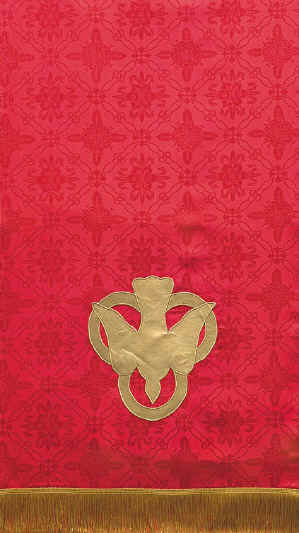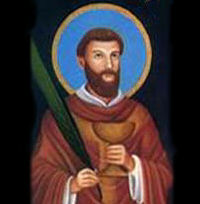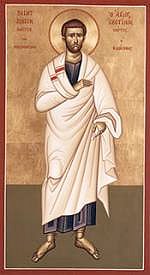 +In the Name of the Father and of the Son and of the Holy Ghost.AMEN.
+In the Name of the Father and of the Son and of the Holy Ghost.AMEN.A new beginning ( Saint John 14, the verses 15-16, 23b-26
How often do we make the sign of the Cross on a daily basis?Before and after the meal, perhaps with your your Morning or Evening Prayers?When we make the sign of the Cross, the following words come to our minds:'Father, Son and Holy Ghost.'On this Vigil of Pentecost and on the Sunday of Pentecost our attention is focussed on that third person, the Holy Ghost.
Throughhou the years, on the feast of Pentecost, you would like to point to that mystery of God. We believe that God has come closer to us in ourlives, so it must possible to get to know the workings of the Holy Ghost.
Can I ask you a couple of questions:
Are you sometimes bad-tempered, you know those moments, when you dont want to face the work that has to be done, or you dont feel like honouring an appointment with some-one, which you have made. Where does this bad temper come from ?
In a conversation with people, have you noticed moments that the atmosphere goes into the wrong direction?One makes a remark, which causes the other ones to be annoyed. A pleasant conversation turns into a diseaster zone. Have you come across those moments when you try to say something and the other misunderstands you. Or the other way around. In a Marriage these situations can be fatal , indeed quite often.
There is an old saying:' The Spirit is out of the bottle'. You cannot control it, it slips away. But... if one of those present in a group can say something really meaningful and good, which will mean that the trouble makers can suddenly resist to make trouble, then we can suddenly see a change.
Courses of bad temper? I did not sleep well, trouble in the workplace, trouble with my children's schooling, a traffic ticket, illness in the family etc etc. That is why I wont to go a step further. Blessed St.Paul says it in this way:' What I want to do, I dont do and what I dont wat to do, I do. What a lot of misery, you want to do good, you want to make the best of things, but you just do the opposite and then this happens not only once, but repeatedly. Blessed St.Paul calls that Sin. You do know what God requires of you, but you dont do it. That is really Sin. He calls that the greatest misery.
Just imagine that God leaves us to our own devices. The world as such it is, is our responsibility, God has enthrusted us with it and we have all the possibilities to turn it into a paradise, but we dont succeed. What do we have instead? The lack of forgiving others, the lack of trusting others, the lack of tolerating others, no room to create the opposite. Yet we have as human beings so many possibilities, our knowledge, our technology, our ability to learn, what is then really missing ?
You do understand it:' The Holy Ghost.'
What then? How do you receive the Holy Ghost? Is that not the reason why you come to Mass?You can come for the music in Church, which caninspire you, you can come for the silence, the meditation, which can calm down your spirit. But all these are like the entree's of a meal, you do miss the main course!
In every celebration of the Mass, we focus on the Holy Ghost. During the Mass we confess our sins, because we dont always live according to God's Holy Spirit.We hear the Holy Gospel, full of the workings of the Holy Spirit. We pray in the Spirit and turn to God. We ask the Holy Spirit to bless the gifts of bread and wine. We take part of a spiritual meal, why?
To supplement of which we are short, to replace our weaknesses with strenght, to soften the hardness in our hearts, to fill the space that is empty, to restore love, to increase hope and to renew our trust in God.
And then things change, sometimes only a few times, at other times a lot longer. We do understand what the other wants to say to us, we see a better meaning than the words and deeds, which dont come acrosss to us too well. We have patience with the other and we ourselves, we become more tolerant and wiser.
In the Eucharist we are fed and we find this too at home in our moments of Holy Prayer. The Holy Spirit teaches us to set the right priorities, so that we can identify what is the most important and what needs to be given priority. So the question is not how God gives us space to live, but if we give space to the Holy Spirit in our lives.
I pray that this feast of Pentecost may bring us endless joy, so that we are not burdened by our weaknesses, but that God comes to our aid with His Holy Spirit. Now is the hope and trust alive that God's Kingdom of Love will become a reality.
Thanks be to God.
I take this opportunity to wish you and all those you love and pray for every Blessing on this feast of Pentecost.
Ed BakkerPostulant
TAC New Zealand



























